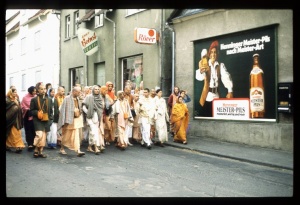CC Madhya 15.36 (1975)

A.C. Bhaktivedanta Swami Prabhupada
Below is the 1996 edition text, ready to be substituted with the 1975 one using the compile form.
TEXT 36
- ei-mata rāsa-yātrā, āra dīpāvalī
- utthāna-dvādaśī yātrā dekhilā sakali
SYNONYMS
ei-mata—in this way; rāsa-yātrā—rāsa dancing of Lord Kṛṣṇa; āra—and; dīpa-āvalī—the day of Dīpāvalī, when rows of lights are lit; utthāna-dvādaśī-yātrā—the festival of Utthāna-dvādaśī; dekhilā sakali—participated in all of them.
TRANSLATION
Śrī Caitanya Mahāprabhu and His devotees participated in all the festivals, including Rāsa-yātrā, Dīpāvalī and Utthāna-dvādaśī.
PURPORT
The Dīpāvalī festival takes place on the dark-moon night in the month of Kārtika (October-November). The Rāsa-yātrā, or rāsa dancing of Kṛṣṇa, takes place on the full-moon night of the same month. Utthāna-dvādaśī takes place the day after Ekādaśī in the waxing fortnight of the moon in the same month. All the devotees of Śrī Caitanya Mahāprabhu participated in all these festivals.